Fort Collins, Colorado, Hgh State Clinic, Hgh Injections, Hrt Doctors
Fort Collins, Colorado Blood Testing Facilities
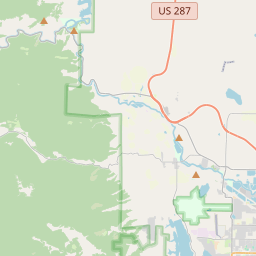

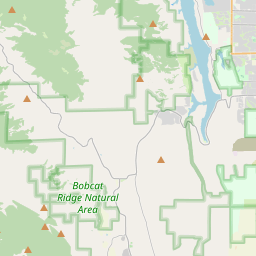



































































 Represents a LabCorp blood testing facility
Represents a LabCorp blood testing facility Represents a Quest Diagnostics blood testing facility
Represents a Quest Diagnostics blood testing facility

Nearby Labcorp Blood Testing facilities:
- Labcorp Center Distance: 4 m, 2126 Milestone Dr Ste 121, Fort Collins, Larimer County, CO, 80524
- Labcorp Center Distance: 41 m, 5377 Manhattan Circle 100, Boulder, Boulder County, CO, 80303
- Labcorp Center Distance: 45 m, 899 Us Highway 287 Ste 500, Broomfield, Broomfield County, CO, 80020
- Labcorp Center Distance: 46 m, 4001 E 120Th Ave, Thornton, Adams County, CO, 80233
- Labcorp Center Distance: 56 m, 3555 Lutheran Pkwy Ste 190, Wheat Ridge, Jefferson County, CO, 80033
- Labcorp Center Distance: 57 m, 1805 Kipling St 111, Lakewood, Jefferson County, CO, 80215
- Labcorp Center Distance: 59 m, 8015 W Alameda Ave Ste 30, Lakewood, Jefferson County, CO, 80226
- Labcorp Center Distance: 62 m, 1550 S Potomac Ste 325, Aurora, Arapahoe County, CO, 80012
- Labcorp Center Distance: 64 m, 601 East Hampden Ave Ste 340, Englewood, Arapahoe County, CO, 80113
- Labcorp Center Distance: 66 m, 8200 E Belleview Ave Ste 234C, Greenwood Village, Arapahoe County, CO, 80111
- Labcorp Center Distance: 67 m, 6169 S Balsam Way Ste 312, Littleton, Jefferson County, CO, 80123
- Labcorp Center Distance: 70 m, 206 W County Line Rd Ste 150, Highlands Ranch, Douglas County, CO, 80129
- Labcorp Center Distance: 71 m, 9141 S Broadway, Highlands Ranch, Douglas County, CO, 80129
- Labcorp Center Distance: 73 m, 10103 Ridgegate Pkwy Ste 123, Lone Tree, Douglas County, CO, 80124
- Labcorp Center Distance: 75 m, 19641 East Parker Square Dr I, Parker, Douglas County, CO, 80134
- Labcorp Center Distance: 81 m, 14 E Allen St, Castle Rock, Douglas County, CO, 80108
Nearby Quest Blood Testing facilities:
- Quest Center Distance: 4 m, 1426 E Harmony Rd, Fort Collins, Larimer County, CO, 80525-3297
- Quest Center Distance: 11 m, 2321 W Eisenhower Blvd, Loveland, Larimer County, CO, 80537-3151
- Quest Center Distance: 21 m, 4548 Centerplace Dr, Greeley, Weld County, CO, 80634-3747
- Quest Center Distance: 32 m, 8134 Colorado Blvd, Firestone, Weld County, CO, 80504-6400
- Quest Center Distance: 40 m, 2798 Arapahoe Ave, Boulder, Boulder County, CO, 80302-6714
- Quest Center Distance: 43 m, 1605 Bridge Street, Brighton, Adams County, CO, 80601-1931
- Quest Center Distance: 45 m, 1601 Coalton Rd, Superior, Boulder County, CO, 80027-4610
- Quest Center Distance: 46 m, 100 E 120Th Ave, Northglenn, Adams County, CO, 80233-5743
- Quest Center Distance: 51 m, 7353 Federal Blvd, Westminster, Adams County, CO, 80030-4903
- Quest Center Distance: 60 m, 695 S Broadway, Denver, Denver County, CO, 80209-4003
- Quest Center Distance: 62 m, 1411 S Potomac St, Aurora, Arapahoe County, CO, 80012-4542
- Quest Center Distance: 64 m, 201 E Jefferson Ave, Englewood, Arapahoe County, CO, 80113-3726
- Quest Center Distance: 67 m, 6179 S Balsam Way, Littleton, Jefferson County, CO, 80123-3095
- Quest Center Distance: 73 m, 27152 Main St, Conifer, Jefferson County, CO, 80433-8546
- Quest Center Distance: 75 m, 11051 S Parker Rd, Parker, Douglas County, CO, 80134-7441
Fort Collins Colorado Hormone Replacement Therapy Services
At our Licensed Hormone Clinic, enhancing your wellness is our number one objective. Our Board Certified Hormone Doctors can help reveal your underlying Hormone Imbalance and Deficiency and help correct your Hormonal Issues so that you can maximize your quality of life and vitality. Our Clinic has helped patients across the state of Colorado achieve greater Hormone Balance, allowing them to overcome HGH Deficiency, Low-T, and more.
Our HRT Clinic serves patients of at least thirty years of age. If our tests show that you can benefit from the Hormone Services that we provide, we will work with you to initiate treatment ASAP!
Finding a Local Fort Collins Hormone Specialist
One of the biggest issues that patients have with regard to Hormone Replacement is seeking out a trustworthy medical professional that understands their needs and desires. Our Hormone Doctors work with local Colorado Doctors in Fort Collins and across the state to facilitate fast and efficient Hormone Deficiency Diagnosis and Treatment.
When you contact our Hormone Clinic by the phone number on this page, we will make contact with a physician in your hometown, or wherever you wish to initiate treatment so that we can fulfill the preliminary requirements of Hormone Assessment with minimal hassle!
Fort Collins Hormone Deficiency Testing
The process to establish a clinical need for HRT Treatment is quite simple. You'll be required to fill out a medical history form before your appointment, which you should be able to complete in a matter of minutes. During the meeting itself, you'll undergo evaluation, not unlike a routine physical. After that, our Affiliate Physician will draw a blood sample which is the key to unveiling your Hormone Needs.
Your blood sample will be thoroughly evaluated via Comprehensive Hormone Panel, which will reveal a vivid snapshot of your Hormone Balance, including IGF-1, Free Testosterone, Cholesterol, and more. With this information in hand, your Prescribing Hormone Doctor will be able to offer a fully informed diagnosis and help you decide what treatment or therapy program will work best to fit your needs, your goals, and your budget!
HGH Injection Treatments in Fort Collins Colorado
Among the many services that our Hormone Clinic offers is Human Growth Hormone Injections for Somatopause. HGH Deficiency is becoming increasingly common among middle age men and women, as external and internal factors promote declining HGH Levels at an earlier age. Human Growth Hormone Deficiency is characterized by symptoms associated with slowing cellular metabolism, including fatigue, reduced exercise capacity, unhealthy weight gain, loss of muscle definition, slow healing, longer bouts of illness, premature wrinkling, and more. With Bio-Identical HGH Shots, you can mitigate the health impact of Growth Hormone Deficiency and facilitate the grace of your golden years!
Sermorelin Clinics in For Collins
Along with tried-and-true HGH Injections, our HRT Clinic also offers Sermorelin Acetate for Growth Hormone Imbalance. The end result of Sermorelin Therapy is the same as with Recombinant Growth Hormone—restored HGH Levels and a respite from the effects of Growth Hormone Deficiency—but the end goal of treatment can be achieved with less out-of-pocket expense, while also promoting natural hormonal rhythms. Our Hormone Doctors also have more flexibility to prescribe Sermorelin Shots, because they can be prescribed off-label, meaning that even if HGH Injections remain slightly out of reach, you can still be prescribed Sermorelin Acetate!
Fort Collins Low-T Testosterone Boosting Therapy
Men—this treatment is just for you! If you've noticed a decline in your sexual prowess, Testosterone Replacement may be the treatment that can change your life. If your sexual desire and satisfaction have fallen off a cliff over recent months or years, Andropause could be the root cause. Andropause is the time in a man's life when declining Testosterone Levels start to have a real effect on male wellness. Most guys know that Low-T can have a crushing effect upon sexual vitality, but it also has clear and present effects on psychological and physical health as well.
Testosterone Deficiency is associated with diminished cardiovascular health, loss of muscle mass, increased BMI, and more. Our Hormone Clinic offers many trusted treatments for Low-T, including Testosterone Cypionate and Enanthate, as well as Transdermal Topical Testosterone Creams and Patches.
Fort Collins Information
Fort Collins is a major city in the state of Colorado which is located between Denver and Cheyenne Wyoming. Fort Collins is one of the oldest populated places in Colorado, originally established in the year 1864 as an Army Outpost. Over the course of the next two decades, more people began to migrate to the area, leading the city to be founded in the year 1883. Fort Collins was named after a Cavalry Officer that fought in the Civil War named William Oliver Collins. Fort Collins is the fourth largest city in Colorado, behind Denver, Colorado Springs, and Aurora, and is slightly bigger than Thornton and Lakewood. Historically, Fort Collins has been one of the more conservative cities in the United States.
Neighborhoods and Suburbs of Fort Collins Colorado
Though Fort Collins is relatively close to Denver, it is an independent city outside of the Denver Metropolitan Area. Among the many neighborhoods of Fort Collins are Troutman Park, Parkwood, Huntington Hills, English Ranch, Observatory Village, Ridgewood Hills, and Old Town. Suburbs of Fort Collins include Loveland, Masonville, Kelim, Windsor, Timnath, Laporte, and Bellvue.
Things to Do in Fort Collins
Fort Collins is a great place to visit for those interested in fishing, boating, and nature. The city is located on the shore of the extensive Horsetooth Reservoir, and Lory State Park and Horsetooth Mountain Park are located just across the water. Timnath Reservoir is just outside the city limits on the eastern side of Fort Collins, and Timnath Public Open Space is a perfect place for a picnic or to hang out with the kids on its many playgrounds and walking trails.
Perhaps ironically, given its reputation during the Prohibition Era, Fort Collins is home to a variety of successful microbreweries, such as Equinox Brewing, the Fort Collins Brewery, Odell Brewing Company, and, most famously, the New Belgium Brewing Company. Other notable places in Fort Collins are The Gardens on Spring Creek, The Center for Fine Art Photography, the Fort Collins Museum, and the Lincoln Center.
All About Fort Collins, Colorado Geographic Area
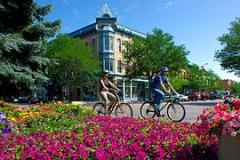
Fort Collins is a Home Rule Municipality situated on the Cache La Poudre River along the Colorado Front Range, and is the county seat and most populous city of Larimer County, Colorado, United States. Fort Collins is located 57 miles (92 km) north of the Colorado State Capitol in Denver. With a 2010 census population of 143,986, it is the fourth most populous city in Colorado. Fort Collins is a large college town, home to Colorado State University. It was named Money magazine's Best Place to Live in the U.S. in 2006, #2 in 2008, and #6 in 2010.
Fort Collins was founded as a military outpost of the United States Army in 1864. It succeeded a previous encampment, known as Camp Collins, on the Cache La Poudre River, near what is known today as Laporte. Camp Collins was erected during the Indian wars of the mid-1860s to protect the Overland mail route that had been recently relocated through the region. Travelers crossing the county on the Overland Trail would camp there, but a flood destroyed the camp in June 1864. Afterward, the commander of the fort wrote to the commandant of Fort Laramie in southeast Wyoming, Colonel William O. Collins, suggesting that a site several miles farther down the river would make a good location for the fort. The post was manned originally by two companies of the 11th Ohio Volunteer Cavalry and never had walls.
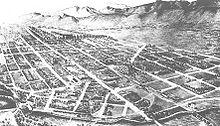
Settlers began arriving in the vicinity of the fort nearly immediately. The fort was decommissioned in 1867. The original fort site is now adjacent to the present historic "Old Town" portion of the city. The first school and church opened in 1866, and the town was platted in 1867. The civilian population of Fort Collins, led by local businessman Joseph Mason, led an effort to relocate the county seat to Fort Collins from LaPorte, and they were successful in 1868.
The city's first population boom came in 1872, with the establishment of an agricultural colony. Hundreds of settlers arrived, developing lots just south of the original Old Town. Tension between new settlers and earlier inhabitants led to political divisions in the new town, which was incorporated in 1873. Although the Colorado Agricultural College was founded in 1870, the first classes were held in 1879.
The 1880s saw the construction of a number of elegant homes and commercial buildings and the growth of a distinctive identity for Fort Collins. Stone quarrying, sugar-beet farming, and the slaughter of sheep were among the area's earliest industries. Beet tops, an industry supported by the College and its associated agricultural experiment station, proved to be an excellent and abundant food for local sheep, and by the early 1900s the area was being referred to as the "Lamb feeding capital of the world." In 1901 the Great Western sugar processing plant was built in the neighboring city of Loveland.
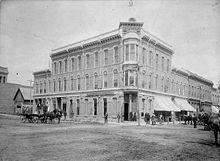
Although the city was affected by the Great Depression and simultaneous drought, it nevertheless experienced slow and steady growth throughout the early part of the twentieth century. During the decade following World War II, the population doubled and an era of economic prosperity occurred. Old buildings were razed to make way for new, modern structures. Along with revitalization came many changes, including the closing of the Great Western sugar factory in 1955, and a new city charter, adopting a council-manager form of government in 1954. Similarly, Colorado State University's enrollment doubled during the 1960s, making it the city's primary economic force by the end of the century. Fort Collins gained a reputation as a very conservative city in the twentieth century, with a prohibition of alcoholic beverages, a contentious political issue in the town's early decades, being retained from the late 1890s until student activism helped bring it to an end in 1969. During that same period, civil rights activism and anti-war disturbances heightened tensions in the city, including the burning of several buildings on the CSU campus.
During the late 20th century, Fort Collins expanded rapidly to the south, adding new development, including several regional malls. Management of city growth patterns became a political priority during the 1980s, as well as the revitalization of Fort Collins' Old Town with the creation of a Downtown Development Authority. In late July 1997, the city experienced a flash flood after and during a 31-hour period when 10 ae14 in (250 ae360 mm) of rain fell. The rainfall was the heaviest on record for an urban area of Colorado. Five people were killed and $5 million in damages were dealt to the city. The waters flooded Colorado State University's library and brought about $140 million in damages to the institution.
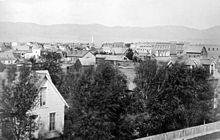

In 2006, Money ranked Fort Collins as the best place to live in America, proclaiming that "great schools, low crime, good jobs in a high-tech economy and a fantastic outdoor life make Fort Collins No. 1." Fort Collins continues to grow in population at a measured pace, with competition from other development in northern Colorado, debate over future growth patterns and town and gown relations emerging as dominant local issues in the early 21st century.
For more information on local history see the Fort Collins Museum and Discovery Science Center's local historical archives.
Fort Collins is located at 40 °33 a²33 a³N 105 °4 a²41 a³W / 40.55917 °N 105.07806 °W / 40.55917; -105.07806 (40.559238, na105.078302). The city is situated at the base of the Rocky Mountain foothills of the northern Front Range approximately 65 miles (105 km) north of Denver, Colorado and 45 miles (72 km) south of Cheyenne, Wyoming. Elevation is 5,003 ft (1,525 m) above sea level. Geographic landmarks include Horsetooth Reservoir and Horsetooth Mountain aeso named because of a tooth-shaped granite rock that dominates the city's western skyline.
According to the United States Census Bureau, the city has a total area of 47.1 square miles (122 km2), of which 46.5 square miles (120 km2) is land and 0.6 square miles (1.6 km2), or 1.27%, is water. The Cache La Poudre River and Spring Creek run through Fort Collins.
Located along the Front Range of the Rocky Mountains, Fort Collins experiences a semi-arid climate (Koppen BSk), with four distinct seasons and low annual precipitation. Summers range from mild to hot, with low humidity and occasional afternoon thunderstorms. Winters range from mild to cold.. The city experiences lots of sunshine, with 300 days of sunshine per year and 19 days with 90 ° + weather. The average temperature in July, the warmest month, is 71 °F (22 °C). The average temperature in January, the coldest month, is 29 °F ( na2 °C). Annual snowfall averages 59 inches (1.5 m), and can occur from early September through the end of May. Average precipitation overall is 15.9 inches (400 mm).
Fort Collins is the fourth most populous city in the State of Colorado and the 185th most populous city in the United States. The United States Census Bureau estimates that in 2005 the population of the City of Fort Collins was 128,026, the population of the Fort Collins-Loveland Metropolitan Statistical Area was 271,927 (163rd most populous MSA), and the population of the Front Range Urban Corridor was 4,013,055.
As of the census of 2000, there were 118,652 people, 45,882 households, and 25,785 families residing in the city. This was an increase from 108,905 in 1998, 87,491 in 1990, 64,092 in 1980, 43,337 in 1970, 14,937 in 1950, and 8,755 in 1920. The metropolitan statistical area (MSA) includes Loveland. When this city is included, the population increases to 251,494 for 2000. The population density was 2,549.3 people per square mile (984.4/km ²). There were 47,755 housing units at an average density of 1,026.0 per square mile (396.2/km ²). The racial makeup of the city was 82.4% White, 3.01% Black or African American, 0.60% Native American, 2.48% Asian, 0.12% Pacific Islander, 3.61% from other races, and 2.53% from two or more races. 10.79% of the population were Hispanic or Latino of any race.
In 2000, there were 45,882 households out of which 29.0% had children under the age of 18 living with them, 44.9% were married couples living together, 7.9% had a female householder with no husband present, and 43.8% were non-families. 26.0% of all households were made up of individuals and 5.9% had someone living alone who was 65 years of age or older. The average household size was 2.45 and the average family size was 3.01.
In the city the population was spread out with 21.5% under the age of 18, 22.1% from 18 to 24, 31.5% from 25 to 44, 17.0% from 45 to 64, and 7.9% who were 65 years of age or older. The median age was 28 years. For every 100 females there were 100.9 males. For every 100 females age 18 and over, there were 99.7 males.
The median income for a household in the city was $44,459, and the median income for a family was $59,332. Males had a median income of $40,856 versus $28,385 for females. The per capita income for the city was $22,133. About 5.5% of families and 14.0% of the population were below the poverty line, including 8.3% of those under age 18 and 5.8% of those age 65 or over.
Fort Collins has a council-manager form of government. The mayor, who serves a two-year term and stands for election in municipal elections held in April of odd-numbered years, presides over a seven member City Council. The current mayor of Fort Collins is Karen Weitkunat, elected in April 2011. The six remaining council members are elected from districts for staggered four-year terms; even-numbered districts are up for election in April 2015 and odd-numbered districts in April 2013.
Fort Collins is the largest city in Colorado's predominantly rural 4th Congressional district, and is represented in Congress by Representative Cory Gardner (Republican). On the state level, the city lies in the 14th district of the Colorado Senate, represented by Bob Bacon and is split between the 52nd and 53rd districts of the Colorado House of Representatives, represented by John Kefalas and Randy Fischer, respectively. All three of Fort Collins' state legislators are Democrats. Fort Collins is additionally the county seat of Larimer County, and houses county offices and courts.
The city maintains a police department.
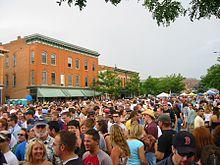
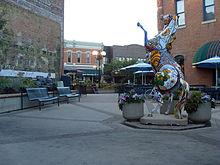
Much of Fort Collins's culture is centered on the students of Colorado State University. The city provides school year residences for its large college-age population; there is a local music circuit which is influenced by its college town atmosphere and is home to a number of well known microbreweries. The Downtown Business Association hosts a number of large festivals each year in the historic Downtown district, including the NewWestFest in late summer, which features local cuisine, music, and businesses. The Fort Collins Lincoln Center is home to the Fort Collins Symphony Orchestra and regularly attracts national touring companies of Broadway plays.
The city's thriving beer culture supports six microbreweries: the New Belgium Brewing Company, the Odell Brewing Company, the Fort Collins Brewery, and the newly created Equinox Brewing, Funkwerks, and the Pateros Creek Brewing Company. New Belgium is the largest of the local craft-breweries, with national distribution from California to states east of the Mississippi. The largest brewer in the world, Anheuser-Busch, also has a brewery northeast of the city near I-25. There are several brewpubs, including the original C.B. & Potts Restaurant and its Big Horn Brewery and CooperSmith's Pub & Brewing, a local mainstay since 1989. The Colorado Brewer's Festival is held in late June annually in Fort Collins. The festival features beers from as many as 45 brewers from the state of Colorado and averages around 30,000 attendees.
The Colorado Marathon is a yearly event running down the Poudre Valley and finishing in Downtown Fort Collins.
The principal venue for the performing arts in Fort Collins is the Lincoln Center, 417 W. Magnolia St., at Meldrum Street. Built in 1978, the center includes the 1,180-seat Performance Hall and the 220-seat Magnolia Theatre, as well as four exhibit galleries and an outdoor sculpture and performance garden. It is home to many local arts groups, including the Fort Collins Symphony, Opera Fort Collins, Canyon Concert Ballet, Larimer Chorale, Youth Orchestra of the Rockies, OpenStage Theatre and Company, Foothills Pops Band and the Fort Collins Children's Theatre. Concert, dance, children's, and travel film series are presented annually. The center is wheelchair-accessible and has an infrared sound system for the hearing-impaired. Ticket prices vary considerably, but children's programs are often free or less than $10, and big name acts and Broadway shows are $18 to $36. The center hosts nearly 1,750 events each year.
The Fort Collins Museum, established in 1941, is a regional center focusing on the culture and history of Fort Collins and the surrounding area. The Fort Collins Museum houses over 30,000 artifacts and features temporary and permanent exhibits, on-going educational programs and events, and is home to four historic structures located in the outdoor Heritage Courtyard.
The Arts are represented by both The Center for Fine Art Photography, FSMOCA Museum of Contemporary Art, and the Bas Bleu Theatre Company.
One daily newspaper, the Fort Collins Coloradoan, is published in the city. Several niche publications including the Fort Collins Courier and Fossil Creek Current are distributed for free at local businesses and by mail. The Rocky Mountain Collegian is Colorado State University's student newspaper, and is published each weekday during the fall and spring semesters. The Collegian is the only daily student-run newspaper in the state, and includes a weekly entertainment tabloid called The Verve.
The Scene Magazine is a longtime entertainment monthly serving several regional cities. Swift Newspapers introduced NEXTnc, a Northern Colorado weekly entertainment and lifestyles newspaper, in March 2006. The Rocky Mountain Parent Magazine] and Parent Pages are niche publications serving northern Colorado families.
The City of Fort Collins publishes the "Recreator," a popular seasonal guide to recreational activities and facilities in Fort Collins. The "Recreator" has continually been published for over 30 years. It is distributed via direct mail, online and locally at libraries, recreation centers and businesses.
Northern Colorado Business Report is also housed in Fort Collins, and is the largest business-to-business newspaper in Northern Colorado. It covers Larimer and Weld Counties.
Colorado State University funds a student-run radio station that focuses on underground and local music, KCSU 90.5 FM; and KRFC 88.9 FM is the local Front Range Public Radio, a volunteer radio station.
One local television station provides coverage of Fort Collins and the surrounding area, NoCo Channel 5, a CBS affiliate. Fort Collins has Public, educational, and government access (PEG) cable TV channels. City Cable 14 is the local Government-access television (GATV) cable channel, and broadcasts city and county meetings, as well as studio-produced local programming. Poudre School District and Colorado State University each have public access stations as well. There is also a Fort Collins Public Access Network (PAN) station, Channel 97 on Comcast, which broadcast 24 hours a day.
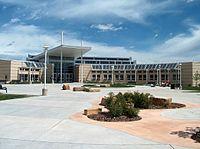
K-12 public education is provided through Poudre School District (PSD), the second-largest employer in Fort Collins after Colorado State University. Fort Collins is home to four major high schools and several charter schools with Middle School and High School grades. They include Fort Collins High School, Rocky Mountain High School, Poudre High School, Fossil Ridge High School, Centennial High School, Polaris School for Expeditionary Learning Outward Bound, Ridgeview classical schools, and Liberty Common School.
The Poudre School District is also home to ten middle schools including Blevins Middle School, Boltz Middle School, Cache La Poudre Middle School, Kinard Core Knowledge Middle School, Lesher Middle IB World School, Lincoln Middle IB World School, Polaris Expeditionary Learning School, Preston Middle School, Webber Middle School, and Wellington Middle School. Liberty Common School and Ridgeview Classical School are K-12 schools and therefore also have middle school students.
PSD is home to 32 elementary schools. The elementary schools range from neighborhood schools, specialized schools, core knowledge programs and the IB program. Among the schools housing the core knowledge program are Moore Core Knowledge, O'Dea Core Knowledge, Traut Core Knowledge and Zach Core Knowledge. Bennett IB World School, Dunn IB World School and McGraw IB World School house the IB program. In addition, PSD is home to a bilingual educational experience at Harris Bilingual. Other schools with an entrance selection include the Lab School and Traut Core Knowledge. The newest elementary school is Bethke, a Core Knowledge school in Timnath, that started in the fall of 2008.
The city has a number of private and charter schools. Ridgeview Classical Schools was rated by U.S. News & World Report (December 2008) among the top ten charter high schools in the nation. T.R. Paul Academy of Arts and Knowledge is a charter school formerly known as Northern Colorado Academy of Arts and Knowledge. Heritage Christian Academy (formerly known as Heritage Christian School) is a private, preK-12 school.
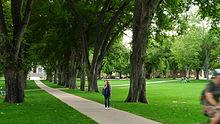
Colorado State University heads up the choices in higher education. Front Range Community College also maintains a campus in the city, and grants Associate's degrees in arts, science, general studies, and applied science. The college offers 17 high school vocational programs and more than 90 continuing education classes. Additionally, the University of Phoenix and Regis also maintain satellite campuses here.
The Institute of Business & Medical Careers provides professional training in the business and medical professions. The institute's first campus was established in the city in 1987.
The Fort Collins Public Library was established in 1900, the sixth public library in the state. The library formed a regional library district through a ballot measure in 2006. It has been renamed, Poudre River Public Library District. The Main Library is located in Old Town, with a second branch shared with Front Range Community College, the Harmony Library. A third branch, Council Tree Library, opened in March 2009 in the Front Range Village Shopping Center. The library also participates in innovative cooperative projects with the local school district and Colorado State University.
Fort Collins has a range of research institutes. Facilities are maintained by the Centers for Disease Control Division of Vector-Born Infectious Diseases, the Center for Advanced Technology and the Colorado Water Resource Research Institute. Other facilities include the Cooperative Institute for Research in the Atmosphere, the Institute for Scientific Computing, the U.S. Forest Service Experimental Station, the National Seed Storage Laboratory, and the U.S.D.A. Crops Research Laboratory.
Fort Collins' economy has a mix of manufacturing and service-related businesses. Fort Collins manufacturing includes Woodward Governor and Anheuser-Busch. Many high-tech companies have relocated to Fort Collins because of the resources of Colorado State University and its research facilities. Hewlett Packard, Intel, AMD, Avago, Beckman Coulter, National Semiconductor, LSI, and Pelco all have offices in Fort Collins. Other industries include clean energy, bioscience, and agri-tech businesses.
The largest employers of Fort Collins residents at the turn of the century were the following:
Regional economic development partners include the City of Fort Collins Economic Health Office, Northern Colorado Economic Development Corporation, Small Business Development Center, and Rocky Mountain Innovation Initiative (RMI2).
FortZED is growing to be the world's largest zero energy district. The FortZED area encompasses the Downtown area of Fort Collins and the main campus of Colorado State University.
FortZED is a set of active projects and initiatives, created by public-private partnerships, which utilize Smart Grid and renewable energy technologies to achieve local power generation and energy demand management. Federal, State, and local funding are making the project a reality. The U.S. Department of Energy has contributed $6.3 million, the Colorado Department of Local Affairs has contributed $778,000 while locally, private companies and foundations have contributed nearly $8 million.
Allegiant Air offers regular passenger airplane service into the nearby Fort Collins / Loveland Airport. Denver International Airport, which is 70 miles (110 km) to the south, is served by nearly twenty airlines. Fort Collins can be approached from Denver by car via Interstate 25 or by way of the RTD bus system and the FLEX regional bus line.
The city's former general aviation airport known as Fort Collins Downtown Airport (3V5) opened in 1966 and closed in 2006.
Fort Collins' downtown streets form a grid with Interstate 25 running north and south on the east side of the city. U.S. Highway 287 becomes College Avenue inside the city and is the busiest street; It runs north and south, effectively bisecting the city.
The city bus system, known as Transfort, operates more than a dozen routes throughout Fort Collins Monday through Saturday, except major holidays.
The Mason Corridor is a planned Bus Rapid Transit that will provide service parallel to College Avenue from Downtown Fort Collins to a new transit center just south of Harmony Road. The trip will take approximately 15 minutes from end to end with various stops between. The service is expected to begin in 2014. Mason Corridor and the Mason Express are intended to the center of future transit-oriented development.
Fort Collins is connected to Loveland, Berthoud, and Longmont via the FLEX regional bus route.
Taxi service is provided 24 hours a day, 365 days per year by Northern Colorado Yellow Cab. Northern Colorado Yellow Cab operates the largest fleet of wheelchair accessible vehicles in Northern Colorado, and also provides courier and paratransit services.
Bicycling is a popular and viable means of transportation in Fort Collins. There are more than 280 miles (450 km) of designated bikeways in Fort Collins, including on street designated bike lanes, and the Spring Creek and Poudre River Trails, both paved. There's also a dirt trail, the 5.8-mile (9.3 km) Foothills Trail, parallel to Horsetooth Reservoir from Dixon Reservoir north to Campeau Open Space and Michaud Lane.
The Fort Collins Bicycle Library lends bicycles to visitors, students, and residents looking to explore the City of Fort Collins. There are self-guided tours from the "Bike the Sites" collection, including a Brewery Tour, Environmental Learning Tour, and the Historic Tour. The Bike Library is centrally located in the heart of downtown Fort Collins in Old Town Square.
Fort Collins also once had a municipally owned trolley service with three branches from the intersection of Mountain and College Avenues. It was closed in 1951 after ceasing to be profitable. In 1983 ae84, a portion of the Mountain Avenue line and one of the original trolley cars were restored as a heritage trolley service, under the same name used by the original system, the Fort Collins Municipal Railway. This has been in operation since the end of 1984 on weekends and holidays in the spring and summer, as a tourist- and cultural/educational attraction.
Parcel service for Fort Collins is provided by FedEx, Airport Express, DHL, Burlington Air Express, UPS, and Purolator. Fort Collins has two-day rail freight access to the West Coast or the East Coast and has eight motor freight carriers. Many local industrial sites have rail freight spur service. The city is served by Union Pacific and Burlington Northern Santa Fe railroads.

Word Count: 4729






